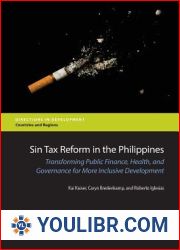
BOOKS - Sin Tax Reform in the Philippines: Transforming Public Finance, Health, and G...


US $5.56

621922

621922
Sin Tax Reform in the Philippines: Transforming Public Finance, Health, and Governance for More Inclusive Development (Directions in Development) (Directions in Development: Countries and Regions)
Author: Kai Kaiser
Year: July 14, 2016
Format: PDF
File size: PDF 6.8 MB
Language: English
Year: July 14, 2016
Format: PDF
File size: PDF 6.8 MB
Language: English
Excise taxes on tobacco and alcohol products can be an effective instrument for promoting public health through curbing smoking and excessive drinking, while raising significant revenues for development priorities. If designed and implemented well, excise taxes can be a win-win for public health and finances. While the public policy rationale for excise reforms is strong in both developed and developing countries, those seeking to make reform happen usually face significant opposition from the tobacco and alcohol industries and other vested interests. Consequently, low-level, complex, and poorly designed excise tax regimes persist. Getting the technical details right and effectively managing the political economy of reforms are vital to securing better excise tax outcomes. In 2012, the Philippines successfully passed a landmark tobacco and alcohol tax reform dubbed the Sin Tax Law. The reform not only greatly increased, simplified, and improved the excise tax regime, but also contributed to the government s Universal Health Care (UHC) goals by earmarking a substantial share of the incremental tax revenues for the health insurance of the poorest 40 percent of the population and other public health programs. The reform was also noteworthy for its emphasis on results monitoring and public disclosure of information. Sin Tax Reform in the Philippines describes the design of the Philippines sin tax reform, documents the technical and political processes by which it came about, and assesses the impact that the reform has had after three years of implementation. A central question is the extent to which the reform is both demonstrational in the sense that it can serve as a model for other reform efforts in the Philippines and elsewhere and transformational in the sense that it indicates a new and different way of bringing about policy change in the Philippines, tackling economic rent-seeking and vested interests, and building coalitions that serve the public interest. This book should be of interest to all who wish to see the health, public finance, and good governance objectives of the Philippines Sin Tax Law attained, as well to those who are pursuing similar reforms in other countries.


























